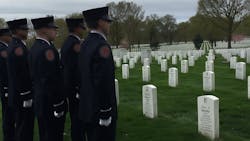10 Lessons Learned: The Role of a Family Liaison in a Line-of-Duty Death
Key Highlights
- Serving as a family liaison following a fire department line-of-duty death requires compassion, patience, flexibility and an unwavering commitment to ensuring that the family’s needs are met.
- One of the first challenges that a family liaison faces is understanding and respecting the unique needs of each family
- Information-gathering should be a gradual process. Ask questions in stages, to ensure that the family has control over decisions while avoiding unnecessary stress.
In the fire service, we train for the worst—structure fires, rescues, medical calls—but nothing truly prepares us for losing one of our own in the line of duty.
For those who are assigned as a family liaison, the responsibility of supporting a fallen firefighter’s loved ones is an honor but also an immense challenge. Unlike emergency calls, there’s no playbook, no standard operating guideline and no checklist that covers everything. Instead, it requires compassion, patience, flexibility and an unwavering commitment to ensuring that the family’s needs are met.
What follows are 10 lessons learned from serving as a family liaison and guidance to those who might one day find themselves in this role.
Lesson 1: Every family is different
One of the first challenges that a family liaison faces is understanding and respecting the unique needs of each family. Some might turn to their faith and community for support; others might rely on family and friends; professional counseling might be leaned on; a combination of all options that are available might come into play. There is no one-size-fits-all approach.
The key takeaway? Offer, don’t impose. Your role is to provide options, not to assume what the family needs. Some might want assistance with meals, childcare or financial resources. Others might prefer privacy. In any case, stay flexible. What the needs are today might change tomorrow.
Approach each conversation with empathy and patience. Let the family lead the way in determining what support they need.
Lesson 2: Communication is a balancing act
A family liaison serves as the bridge between the grieving family and the fire department. This means gathering essential information about funeral arrangements, benefits and honors, while also shielding the family from an overwhelming flood of questions.
Timing is critical. The department might want immediate answers, but the family needs space to grieve. Instead of bombarding them with logistical questions in the first few days, prioritize their well-being and build trust.
Information-gathering should be a gradual process. Ask questions in stages, to ensure that the family has control over decisions while avoiding unnecessary stress.
Lesson 3: You can’t do it all
It’s natural to want to handle everything personally, but trying to do so will lead to burnout. The fire service is a family, and many will want to help. Let them. Assign responsibilities, such as meal coordination, transportation or childcare arrangements, to others who are willing and able.
Although the family liaison is the primary point of contact, that person doesn’t have to be the one who makes every phone call or solves every logistical issue. Surround yourself with a support network to share the workload. Lean on your fellow firefighters. Accept help and delegate tasks to ensure that the family’s needs are met effectively.
Lesson 4: Honor the family’s wishes, even when it’s difficult
The department might have traditions for honoring a fallen firefighter, but the family’s wishes come first. If they don’t want a full fire service funeral, respect their decision. If they request something that seems challenging, such as holding the service in a small church, it’s your job to find solutions, not reasons why it can’t be done.
When a request truly can’t be accommodated, don’t just say no. Offer alternatives that align with their intentions while respecting logistical realities.
The family’s needs take priority over department expectations. Do everything possible to honor their requests with creativity and flexibility.
Lesson 5: Know the available resources
From financial aid to funeral assistance, numerous organizations exist to support the families of fallen firefighters. The National Fallen Firefighters Foundation, Tunnels to Towers Foundation, Fire Family Foundation and other organizations offer critical services. The local firefighter union or association will be a great resource to help to find personnel and programs in your area. In California, the California Last Alarm Service Team (Cal-LAST) provides specialized assistance in planning line-of-duty funerals. Check your local resources to find all available assistance that the department or family might need.
Additionally, the department’s Employee Assistance Program (EAP) can offer mental health support for both the family and department members. Although the family liaison shouldn’t reach out personally to all of these organizations, that individual should be prepared to connect the family and department with the right resources.
Educate yourself on available resources before you need them. Being prepared can make a significant difference to the support that’s provided.
Lesson 6: Take care of yourself
Serving as a family liaison is an emotional rollercoaster. You will experience sadness, frustration, stress and exhaustion. The role demands time away from your own family, and at times, it will feel as though you’re living multiple lives: firefighter, liaison, spouse and mourner.
It’s crucial to recognize your own limits. Seek support from your fellow firefighters, talk to a chaplain or counselor, and don’t hesitate to use the EAP for yourself. The weight of this responsibility is heavy; don’t carry it alone.
Self-care isn’t a luxury; it’s a necessity. You can’t support a grieving family fully if you’re running on empty.
Lesson 7: Managing media and public attention
In the aftermath of a line-of-duty death, media attention can be overwhelming. The family might be approached by reporters, and the department likely will receive public inquiries. As a family liaison, you aren’t responsible for handling media relations, but you should help to shield the family from unwanted attention.
Encourage the department to designate a public information officer (PIO) to manage external communications. Ensure that the family knows their rights regarding privacy and help to guide them in deciding what information, if any, that they wish to share publicly.
Protect the family’s privacy and direct media inquiries to the appropriate department personnel. Don’t let external pressures interfere with the grieving process.
Lesson 8: Handling department politics and internal struggles
An LODD affects an entire department, and unfortunately, differing opinions on how to handle arrangements can lead to internal conflicts. As a family liaison, you might find yourself in the middle of these disagreements. Your primary focus always should remain on the family’s needs and wishes. If internal conflicts arise, lean on senior leadership or honor guard coordinators to help to mediate. Avoid engaging in political battles and keep your role centered on supporting the grieving family.
Stay above internal department conflicts. Your duty is to the family, not department politics.
Lesson 9: Supporting the firefighter’s crew and close friends
Although much attention rightfully is placed on the family, the fallen firefighter’s crew and close friends also are affected deeply. They might struggle with grief, guilt or even anger. Some might need space, while others will want to stay actively involved in planning memorial services.
Recognize that they, too, are mourning. Encourage them to seek counseling or peer support and make sure that they have opportunities to pay their respects in a way that helps their healing process.
Family members might want to speak with or spend time with the crew with which their loved one spent more than one-third of his/her time. This interaction can help both parties traverse the grieving process.
Acknowledge the effect on the firefighter’s closest colleagues. Offer them support and ensure that they have resources to process their grief.
Lesson 10: Preparing for the long-term needs of the family
Grief doesn’t end after the funeral. Families often struggle long after the ceremonies are over, and they might need ongoing support. Survivor benefits, scholarships for children and continued emotional support are things that can make a difference in the months and years after the member’s death. Some benefits might take some time to get established, and short-term direct-donation opportunities might be available to assist with family finances. Additionally, long-term or automatic monthly donations might be a way that all department members can be given the opportunity to assist.
Stay in touch with the department’s resources and any local support groups that assist families of fallen firefighters. Follow up periodically with the family to ensure that they know that help still is available.
The family’s needs extend beyond the immediate aftermath. Long-term support is just as important as initial assistance.
Humanity and compassion
Being a family liaison in the wake of an LODD is a profound responsibility, one that no firefighter hopes to take on, yet one that’s critical when the unthinkable happens. The lessons learned in this role aren’t just about logistics or procedures; they are about humanity, compassion and the enduring strength of the fire service family.
At the end of the day, the best that you can do is the least that you can do for a family who have lost everything. Honor their fallen hero by standing beside them, guiding them through their grief and ensuring that they never feel alone.
About the Author

Aaron Todd
Aaron Todd is a captain/paramedic with the Sacramento, CA, Metropolitan Fire District and deputy commander of the Local 522 Honor Guard. With 25 years of fire service experience and 20 years of Honor Guard experience, he has represented the fire service during some of its most difficult moments, including serving as a family liaison following a line-of-duty death. Todd has instructed in multiple recruit academies.
